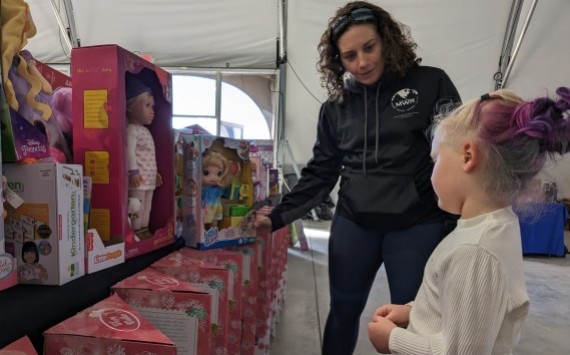Five candidates took part in tryouts for a Fort Irwin team of law enforcement officers that will enhance the security and safety of this installation, Jan. 19-21.
Headquarters and Headquarters Company, United States Army Garrison at Fort Irwin hosted the tests for four military policemen and one Department of the Army civilian police officer. The tryouts consisted of an obstacle course, KIMS game, Army physical fitness test, urban land navigation, ruck marches, M4/M9 stress shoot, a three-mile run and appearing before a board.
The candidates could eventually be accepted into a military Special Reaction Team, which is similar to a SWAT team (special weapons and tactics) in civilian law enforcement agencies.
Sergeant Maj. Randy Cheadle, Fort Irwin Directorate of Emergency Services sergeant major, said the objective is to put together a group of specialized officers, who would be on short-notice recall for emergency incidents. The selected members would receive SRT phase 1 training at Fort Leonard Wood, Mo., in the very near future.
“Every installation is required to have a Special Reaction Team that is assigned to the commanding general to react to any type of significant event that occurs on the installation – whether it’s an active shooter, a hostage situation, a barricaded subject or something where you need a team of law enforcement professionals to do a dynamic entry,” Cheadle said.
Cheadle explained that USAG Fort Irwin Command Sgt. Maj. Daniel O’Brien recommended the implementation of organizing the SRT. O’Brien and Cheadle collaborated in creating two SRTs when serving together at Fort Bliss, Texas with the 93D MP Battalion, 89th MP Brigade.
The military policemen who participated in the tryouts serve with HHC and are: Spc. Zachary Oden, Spc. Hunter Siems, Spc. Edward Warner and Sgt. Brian Mariscal. The civilian officer, Andrew Fremstad, serves with DES.
Fremstad said he was interested in trying out for the SRT because of the tactical and weapons training and the challenge of the duties. He has been in law enforcement for nine years and this, if selected, would be his first assignment on a SWAT team. The SRT training would instruct on how to handle dangerous situations, make quick decisions to deal with threats – all the while maintaining officer safety.
Mariscal stated that SRT training is one of the most sought-after schools by military police in the Army. The tryouts have placed the candidates in challenges as a team, but they’ve worked together on different shifts the past several months, so there was already some familiarity.
“Physically and mentally it’s been a lot tougher than most of the stuff I’ve been through before,” Oden said. “I’m air assault qualified, so I’ve been through this type of stuff before, but they’ve definitely been pushing us for the last two days.”
One MP who has already trained in SRT, and recently selected National Training Center Soldier of the Quarter, Spc. Daniel Diaz, stated the SRT school would be a once-in-a-lifetime experience.
“We train in so many different situations,” Diaz said. “We train in barricaded subjects, hostage situations, active shooters, high-risk warrants, drug busts.”
Cheadle explained that these tryouts, and subsequent ones, would help select the most capable and professional candidates to attend the school.
“Fort Irwin can be quiet proud of the Special Reaction Team they’ll get when they come back,” Cheadle said.












